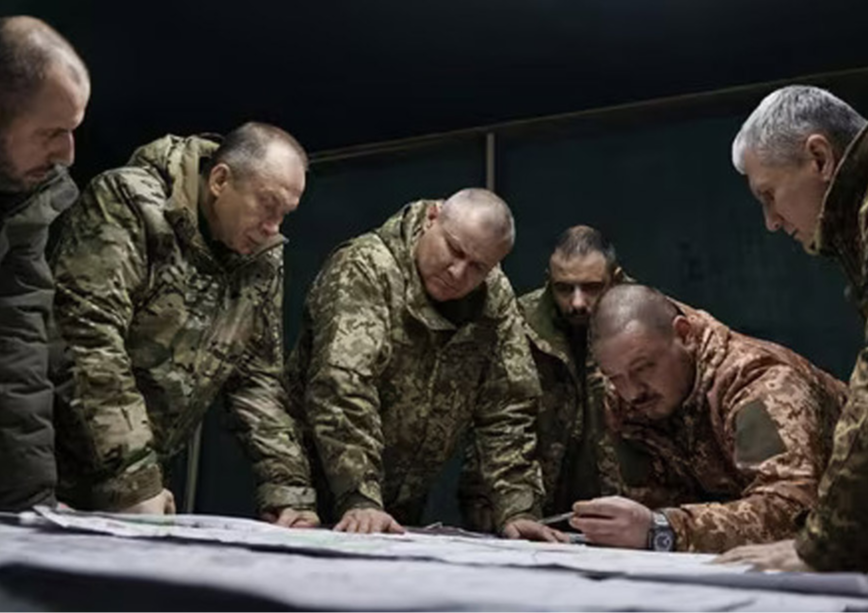-
CENTRES
Progammes & Centres
Location
Ukraine’s military campaign is indeed faltering but it is also the West’s political strategy that is unravelling.

Ukraine’s President Volodymyr Zelensky recently replaced his top military commander, General Valerii Zaluzhnyi, with General Oleksandr Syrskyi, an experienced Ukrainian ground forces commander. This change at the apex of Ukraine’s military leadership is significant as Kyiv is reeling under military pressure from the Russian forces at this stage of the war. A former commander of the Ukrainian forces, Syrskyi is not a completely anonymous or non-controversial choice as he is considered responsible for failing to defend Bakhmut, which came at the price of considerable Ukrainian combat casualties. Nevertheless, he is widely respected for his command competence which he demonstrated in the robust defence of Kyiv following Russia’s full-fledged invasion of Ukraine in late February 2022. To his operational distinction, he added another feather to his cap – the successful counter-offensive mounted by Ukrainian ground forces that led to the capture of Kharkiv liberating it from Russian control. Despite the heavy bloodletting involved in defending Bakhmut, Syrski’s strengths outweigh and offset that single blemish on his operational and command record.
A former commander of the Ukrainian forces, Syrskyi is not a completely anonymous or non-controversial choice as he is considered responsible for failing to defend Bakhmut, which came at the price of considerable Ukrainian combat casualties.
At the strategic level, the North Atlantic Treaty Organization (NATO) member countries are becoming increasingly divided over support for Ukraine. This has manifested itself, especially in the case of the United States (US) failing to complete the delivery of a robust military aid package for Ukraine. Republican members of the House of Representatives have blocked a $110-billion aid package for Kyiv. This presents a serious problem for Ukraine’s war effort against Russian military advances. As a result of the gridlock in the US Congress, Kyiv has been compelled to ration the use of ammunition and ordnance, rendering its defences weaker and halting the possibility of any sustained advances the Ukrainian forces might make against Russian positions in Eastern Ukraine. These developments come against the backdrop of Ukraine’s failed counter-offensive, which was launched last July and is now gravely and perilously compounded by the possibility of losing American military aid. Ukrainian battlefield performance and successes hinge on American military aid. As Jake Sullivan, US national security advisor (NSA), made clear: “There is no alternative to these (American) funds.”
Consequently, Ukraine runs the risk of losing additional territory, let alone recovering the region of Donbas and Crimea, which make up 20% of Ukraine’s territory that Moscow seized in 2014. This would be a direct consequence of aid drying up completely with Kyiv conceding greater Russian gains in the western part of Ukraine, which it presently controls. The only silver lining is that the European Union (EU) aid of 50 billion euros to Ukraine has been released following Hungarian leader Viktor Orban’s decision to lift his veto on further assistance to Ukraine. This EU aid, however, is geared primarily toward meeting Ukraine’s economic needs, keeping its government running and infrastructure afloat: It can do little to meet Ukraine’s war effort against Russia’s rejuvenated military campaign. Ukraine’s military has not captured any significant territory since the final months of 2022.
Russian artillery strikes are already outgunning and even outnumbering Ukraine’s artillery capabilities around Avdiivka and other areas on the frontline.
Three developments at the level of tactics are starting to unravel the Kyiv military campaign. First, the possible loss of the city of Avdiivka in eastern Ukraine, which the Russians are poised to capture. Russian artillery strikes are already outgunning and even outnumbering Ukraine’s artillery capabilities around Avdiivka and other areas on the frontline.
Second, Ukrainian air defences are depleting rapidly, preventing Kyiv from defending and intercepting Russian missiles and drones that are devastating critical infrastructure. Third, as the delay in Congressional funding persists, Ukrainian air defences cannot intercept Russian jets executing strikes against targets in western Ukraine, which they were able to do earlier. Strategic gridlock and policy paralysis in Washington are seriously threatening not just hard-won military gains, but imperilling the defence of territory in western Ukraine, which would have been hard to conceivably fathom even a few months ago.
Given the ammunition and ordinance scarcity facing Kyiv and the imperative to conserve strength for future battles, Ukrainian forces may be compelled to give up territory in the east and fall back on positions that are more vital, especially in the west of the country. Disheartening and even demoralising as this may be for Ukraine, it is the most credible option available now, unless Washington overcomes the deadlock on Capitol Hill that would lead to the release of funds to service the desperately needed assistance Kyiv requires.
Ukrainian air defences are depleting rapidly, preventing Kyiv from defending and intercepting Russian missiles and drones that are devastating critical infrastructure.
It is no wonder that Russian President Vladimir Putin seems more convinced than ever that time is on his side and all he has to do is wait out the US where Donald Trump is already suggesting he would “encourage” Russia to attack any NATO member that fails to pay its share of the organisation’s budget. In his recent interview with the former Fox News journalist Tucker Carlson, Putin confidently asserted that Russia is “ready for dialogue” and “willing to negotiate” because he views this as a moment when the tide of war seems to be turning in his favour and NATO beginning to realise that defeating Russia on the battlefield will be impossible. From this position of strength, Putin can argue that “sooner or later this will end in agreement”.
Ukraine’s military campaign is indeed faltering but it is also the West’s political strategy that is unravelling.
This commentary originally appeared in Hindustan Times.
The views expressed above belong to the author(s). ORF research and analyses now available on Telegram! Click here to access our curated content — blogs, longforms and interviews.

Professor Harsh V. Pant is Vice President – Studies and Foreign Policy at Observer Research Foundation, New Delhi. He is a Professor of International Relations ...
Read More +
Kartik Bommakanti is a Senior Fellow with the Strategic Studies Programme. Kartik specialises in space military issues and his research is primarily centred on the ...
Read More +